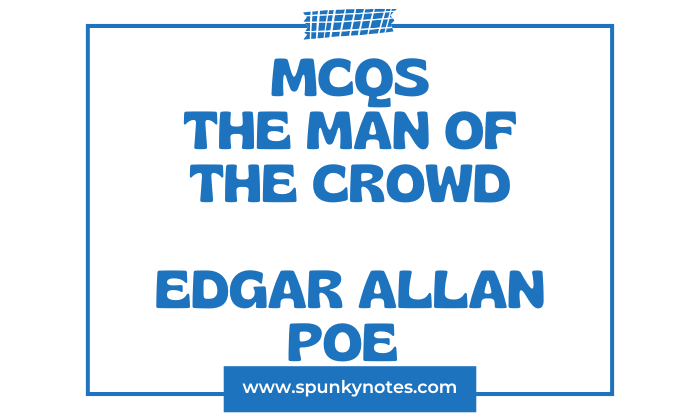
The Man of the Crowd MCQs
1. Who is the author of “The Man of the Crowd”?
A. Charles Dickens
B. Edgar Allan Poe
C. Nathaniel Hawthorne
D. Herman Melville
2. What is the setting of “The Man of the Crowd”?
A. London
B. Paris
C. Berlin
D. New York
3. Which literary genre does “The Man of the Crowd” belong to?
A. Mystery
B. Romance
C. Science fiction
D. Comedy
4. What is the main theme of “The Man of the Crowd”?
A. Love and loss
B. Alienation and loneliness
C. War and peace
D. Nature and beauty
5. Which character is central to the narrative of “The Man of the Crowd“?
A. An old man
B. A young woman
C. A police officer
D. A street vendor
6. How does the narrator first observe the man of the crowd?
A. Through a café window
B. In a dream
C. During a conversation
D. Through a friend’s story
7. What does the old man’s appearance suggest about his character?
A. Wealth and power
B. Poverty and despair
C. Mystery and intrigue
D. Joy and contentment
8. What does the narrator do upon seeing the old man?
A. Ignores him
B. Reports him to the police
C. Follows him
D. Confronts him
9. What aspect of the crowd is highlighted in the story?
A. Its uniformity
B. Its diversity
C. Its hostility
D. Its intelligence
10. How does the old man behave when he is in the crowd?
A. Nervously
B. Aggressively
C. Indifferently
D. Excitedly
11. What is the narrator’s reaction to the old man’s actions?
A. Amusement
B. Disgust
C. Curiosity
D. Fear
12. Why is the old man considered “the man of the crowd”?
A. He is famous
B. He is always alone
C. He epitomizes the essence of the crowd
D. He is a public figure
13. What time of day does most of the story occur?
A. Morning
B. Afternoon
C. Evening
D. Night
14. What can the reader infer about the narrator’s personality?
A. Outgoing and friendly
B. Introverted and observant
C. Aggressive and dominant
D. Carefree and negligent
15. What ultimately happens to the man of the crowd?
A. He disappears into the crowd
B. He is arrested
C. He returns home
D. He is helped by a passerby
16. How does the story “The Man of the Crowd” end?
A. With a dramatic confrontation
B. With a resolution of the mystery
C. With the narrator giving up the pursuit
D. With a celebration
17. What literary device is predominantly used in describing the city setting?
A. Simile
B. Metaphor
C. Personification
D. Hyperbole
18. What is the narrator’s primary emotion throughout the story?
A. Joy
B. Sadness
C. Anger
D. Fascination
19. Which element does Poe use to create a sense of mystery in the story?
A. Detailed descriptions
B. Ominous settings
C. Clear explanations
D. Comic relief
20. How does the story reflect the themes of urban anonymity and isolation?
A. Through the setting
B. Through the characters’ dialogue
C. Through the plot
D. Through the narrative perspective
21. What aspect of human nature does “The Man of the Crowd” explore?
A. Compassion
B. Curiosity
C. Greed
D. Honor
22. How does the story “The Man of the Crowd” begin?
A. With a crime
B. With a party
C. With a scene in a café
D. With a funeral
23. What does the presence of the crowd symbolize in the story?
A. The anonymity of city life
B. The warmth of the community
C. The dangers of urban areas
D. The beauty of diversity
24. How does the dense urban setting affect the story’s mood?
A. It creates a sense of safety
B. It enhances the sense of mystery
C. It induces a romantic mood
D. It provides comic relief
25. What does the story suggest about the possibility of truly understanding another person?
A. It is entirely possible with effort
B. It is easy if one is attentive
C. It is challenging but achievable
D. It is ultimately unachievable


